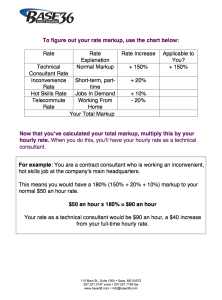“I didn’t get the job, and I don’t know why.  Was I unqualified? No, that can’t be it. I met all of the requirements. Did my personality not fit the workplace? Maybe, but I’m charming. And I felt immediately at home, even joking around with some of the interviewers. Let’s put that one on the back burner. Wait. Did I ask for too much money? Did I commit a professional faux pas there? How do I even know if that’s the case?”
Was I unqualified? No, that can’t be it. I met all of the requirements. Did my personality not fit the workplace? Maybe, but I’m charming. And I felt immediately at home, even joking around with some of the interviewers. Let’s put that one on the back burner. Wait. Did I ask for too much money? Did I commit a professional faux pas there? How do I even know if that’s the case?”
While this might not be the exact script that goes on in your head after you’ve been denied a job, you’ve probably asked yourself that last set of questions. Determining the right way to ask for a compensation value can be tricky, which is why we’ve established the list of the three most common mistakes you can make during this part of the job application process. Hopefully, we will prevent you from making any professional faux pas.
1) Not Knowing Your Market Value
Your monetary worth will change depending on both the location of your position and on your skill set.
The surprising thing?
So few people understand that. They believe that because they were making $100,000 in NYC, they should be making that much money in Portland, ME. Unfortunately, with the lower cost of living in Portland than NYC, that’s not the case.
When you are entering into a new scene, whether it be geographically or skill-wise, you need to do your research. Learn what similar positions in the area are offering for wages and benefits.
If you do this, your desires won’t be too far off of that of your hiring company. As a result, you won’t have to question whether or not the hiring decision came down to money.
If you don’t do this, however, you could be in trouble. If your rate is too high, you’ll be a target for dismissal from the applicant pool.
2) Asking For More Than You Are Worth
Once you understand what your market value is, don’t try to get more money than you are worth. It will make you look like you’re trying to pull a fast one, which will get you crossed off of the applicant pool list before you can say “money.”
If you ask for reasonable compensation, however, you establish a trusting relationship. As in any relationship, this can go a long way. You may find yourself being called 2 years down the road and asked if you are qualified to do X. That’s more money in the bank in the long run.
Know your worth, stick to it, and don’t ask for more.
3) Expecting the Same Kind of Pay Increase After 5 Years
During your first 5 years in the industry, you will often find that you are on a steep earning trajectory. After 5 years, however, your earning potential often levels off unless your responsibilities continue to change dramatically.
What does this mean for the application process? If you have been in the field for the past seven years, and in your current role for the last two, don’t add tens of thousands of dollars to your compensation request. You’ll be asking for too much. And, as we know, that never ends well.
While there are certainly other faux pas you can make during the job application process, asking for the appropriate amount of money does not have to be one of them. Remember that once you know your market value, stick to it. You can always walk away from a job offer that does not value you appropriately.
These are only three of the most common mistakes that people making when filling out the monetary aspect of their job application. Are there others? Do you have any advice for people in this situation? Let us know in the comments section or join the conversation on Facebook, Twitter, and LinkedIn.
Thanks to Chicago Art Department for the use of their respective photographs.


